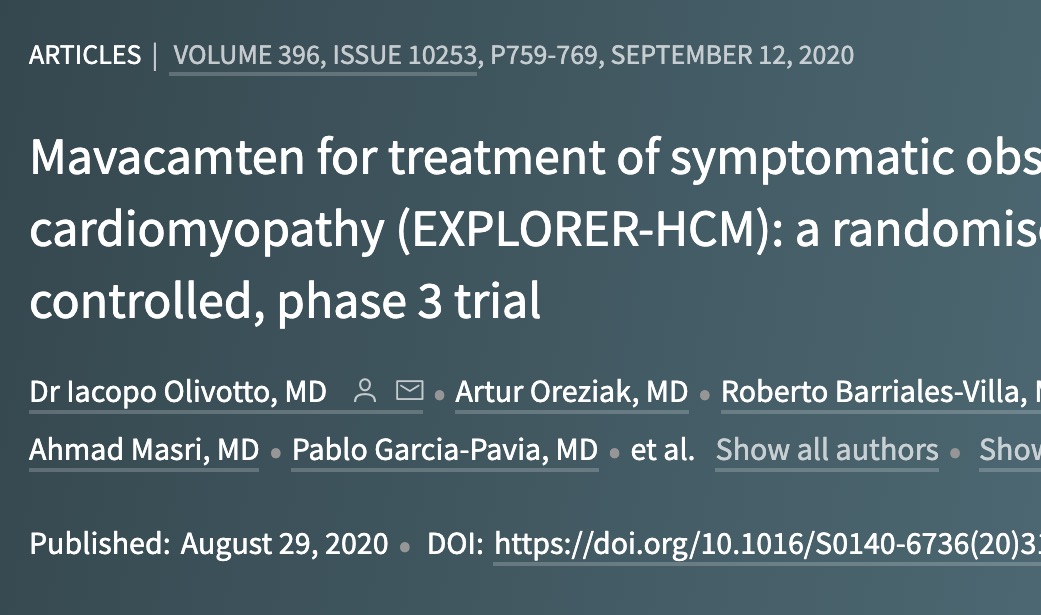New drugs for Hypertrophic Cardiomyopathy: towards precision medicine in cardiology
Prof. Jacopo Olivotto, Cardiomyopathies Unit - AOU Careggi Florence

Prof. Iacopo Olivotto
When one thinks of a heart disease, one generally thinks of a heart with a depressed function, as in the case of a patient with a previous extensive myocardial infarction, or of the classic classic decompensation called "hypokinetic" or with "reduced systolic function", terms which indicate a contractile deficit of the heart muscle. Indeed, this is by far the predominant model in cardiology, and the one for which nearly all drugs currently available in medical practice have been developed. The development of the now classic anti-decompensation drugs, such as ACE inhibitors and beta-blockers, have radically changed the prognosis of patients with this type of heart disease.
Hypertrophic Cardiomyopathy (HCM) represents a rarer and entirely different model. It is a genetic pathology caused by a defect in the genes of the contractile proteins of the heart, real building blocks of the engine of our organism. The peculiarity is that instead of weakening the heart muscle, the mutations function as a sort of natural "doping" and enhance its functionality. From a diesel engine which is normally the heart, in these patients the hearts become turbo custom-built.
This state of affairs can initially be well tolerated and even favorable - so much so that many young patients are asymptomatic and even have excellent sports performance. However, the resulting energy expenditure leads to progressive structural alterations, which are at the origin of the fragility of these hearts; fragility that can occur at any age with arrhythmias, symptoms and progression to heart failure and then decompensation. This is especially true in the forms in which the hypertrophy and alterations of the mitral valve, often present, cause an obstruction to the flow of blood that comes out of the heart with each contraction: the so-called Hypertrophic Obstructive Cardiomyopathy, present at rest in about 1/3 of patients and in about 70% during an effort, particularly after a meal.
Despite an impressive advancement of knowledge in this area and improvement of symptoms and quality of life in many patients with currently available drugs, a specific drug treatment had not yet been developed, with a drug acting at the level of the basic molecular mechanisms of disease, trying to normalize the contractile, energetic situation and natural history. Fortunately, this is all about to change.
On the basis of genetic and molecular studies developed in the last 20 years, it has been hypothesized that small molecules able to bind to cardiac "myosin", that is the key protein, fundamental for the contraction of the heart, and to reduce its
super-activity, could be of benefit in patients with Hypertrophic Cardiomyopathy.
From the start, the experiments effectively showed a normalization of various abnormalities both on isolated cells in the laboratory and in animal models. Two molecules with such properties have been developed and introduced to patient trials: Mavacamten (MYK-461) and CK-274.
The first has now come to complete an important Phase 3 study, that is a clinical trial preparatory to placing on the market; Mavacamten is likely to be available to patients in the course of 2021, after further safety checks required by the US (FDA) and European (EMA) agencies. The Explorer HCM study, in which the Florence center participated, was presented at the prestigious congress of the European Society of Cardiology last August.
This is a trial conducted on over 60 centers in the USA and Europe, on 251 patients with Hypertrophic Obstructive Cardiomyopathy, randomized to receive Mavacamten or placebo. Over the course of 30 weeks of treatment, Mavacamten was able to markedly improve blood flow obstruction, symptoms, functional capacity and quality of life in about 2/3 of patients.
The important thing, being a completely new drug, is that these results were obtained in a safe way, with a profile similar to placebo in terms of side effects and adverse events.
This study can be considered a milestone in the history of CMI, not only because it finally brings patients a specific and highly effective drug, but also because it opens up new scenarios, in terms of investments and development for the entire cardiomyopathies sector. Just as the past decade has represented a decisive turning point for cancer therapy, with the development of hundreds of "targeted" molecules that have led to unthinkable results in the cancer patient, so the decade that has just begun promises to bring an epochal turning point for heart diseases , starting with the forms of genetic origin.
There is still a long way to go, and entire areas of precision medicine - such as gene therapies - are still in an embryonic state in cardiology. We can say that we are only at the beginning of this journey, which will require time, investment and powerful synergies between patients, healthcare professionals, researchers and industry.
But as an Arab proverb says: “Whoever is on the right path has already arrived”.

